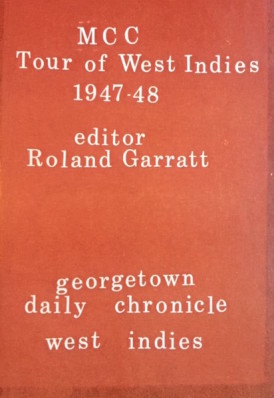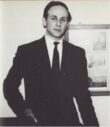England v West Indies In Print
Martin Chandler |
The first Test series between England and the West Indies was played in 1928 when a team led by Karl Nunes came to England to play three Tests. They returned and did the same again in 1933 and 1939. During the period England twice visited the Caribbean, in 1929/30 and 1934/35. No account of any of those tours was published at the time, although they are referred to at some length in some more general historical or biographical books. England won their home series easily enough, but sides shorn of the very best England players struggled in the Caribbean. The 1929/30 series was shared, and five years later West Indies won a Test series for the first time.
Eventually the 75th anniversary of that 1928 tour saw the release of a book, A Nation Imagined, written by the Bajan academic Hilary Beckles. News hot of the press is that a book on the 1933 and 1934/35 tours entitled A War to the Knife is about to be self-published by Richard Bentley.
In 1947/48 England visited the Caribbean. For the third time MCC seriously misjudged the strength of the West Indians in home conditions but even a late call to Len Hutton to reinforce an understrength side could not prevent a West Indian victory. There is one account of the tour, written by Roland Garrett and published in the Caribbean. Copies are seldom seen.
In 1950 England once again under-estimated the talent of a West Indian team, although as they were at home and at full strength themselves there were no excuses. The visitors won a famous 3-1 victory that was celebrated in great style by the Windrush generation. Calypsos were recorded and released, but just one book, John Arlott’s Days at the Cricket, appeared at the time. Fifty years later in 2000 Vijay Kumar published Cricket Lovely Cricket, a beautifully produced book with a limited edition signed by each of the six survivors of the trip. It was a fitting tribute to Kumar’s countrymen of fifty years previously, even if the author did rather blot his copybook later when he was jailed for the theft of cricket books and memorabilia.
England’s 1953/54 trip to West Indies was certainly the most controversial tour since ‘Bodyline’ and the 2-2 draw was the subject of full length books from English journalists, Alex Bannister and EW ‘Jim’ Swanton. Both are worth reading but the book I am really looking forward to is a retrospective account that I am assured is to be one of Fairfield Books’ final offerings.
The West Indies side that toured England in 1957 was full of great players, the problem was that without exception all were either at the end of their careers, or had barely set out on them. England won the series comfortably and only the veteran writer Bruce Harris, whose first cricket book had been written about the ‘Bodyline’ tour, went into print; West Indies Cricket Challenge is the title.
In 1959/60 England finally managed to win a series in the Caribbean, thirty years after their first attempt. There were two books on the tour, both published in England. Swanton’s is a decent account but the better by a distance is Through the Caribbean by Alan Ross, one of the very best of tour accounts.
At this stage the number of tour books appearing was on the wane, but the genre still had some life in it and the visit of Frank Worrell’s West Indians in 1963 inspired four books. Full accounts of the trip were published by John Clarke, Ian Wooldridge and John Barker, but once again the best book was by Alan Ross, The West Indies at Lord’s, even it it was concerned only with the nail biting draw in the second Test.
The 1966 West Indians, led this time by Garry Sobers, won a superb series in the summer the England soccer team won the World Cup. Neither of the two accounts of the series, Everything That’s Cricket by John Clarke and King Cricket by Sobers himself do justice to the quality of the cricket played.
In 1967/68 England visited the Caribbean again, a series they won thanks to an infamous declaration by Sobers in the fourth Test. The man who should have captained the England side, Brian Close, spent the tour in the press box and wrote a book on the tour. Again Barker was responsible for a tour account and, a year or so later the series was one of three covered in Henry Blofeld’s Cricket in Three Moods. Close’s contribution is probably the best, but none are classics of the genre. Also covered in Blofeld’s book was the West Indies short three Test visit to England in 1969.
Sobers’ swansong was in the Caribbean in 1973/74 and the visit of Mike Denness’s England side. There were two books this time, firstly a traditional tour account, Testing Time, from Christopher Martin-Jenkins, and also a rather more eccentric publication from Michael Gibbes that was published in Trinidad with the same title. CMJ’s account is an excellent one, and Gibbes’ book is certainly worth buying if a copy becomes available.
The first incarnation of the West Indies side that would dominate world cricket for two decades came to England in 1976. The series played out in that long hot summer changed the tone of the game forever, yet the only contemporary account was a scorebook from BBC scorer Bill Frindall. It would be 30 years before David Tossell published Grovel, one of the best, if not the best retrospective story of a cricket tour ever written.
England did not visit West Indies between 1976 and 1980 when, the home side led for the first time by Ian Botham, the men in the maroon caps returned to England. Botham’s team avoided defeat in three of the Tests, so actually did pretty well. There was no tour book however, although three did appear covering the return visit in 1980/81, a trip overshadowed by the tragic death of Kenny Barrington. The authors in question were Peter Smith and Geoffrey Boycott with two workmanlike accounts, and a rather more enjoyable book from the always readable Frank Keating; Another Bloody Day in Paradise.
For some reason publishers decided to give the 1984 West Indies series, the first of the back to back ‘blackwashes’ a miss. It was a grim series for England supporters, but if ever a series cried out for a retrospective account then surely it is this one. Perhaps one day we will see it.
The second ‘blackwash’ came in 1985/86, immediately after the Ashes were regained. The only book written on the trip was a very good one by the writer wife of England left arm spinner Phil, Frances Edmonds. Another Bloody Tour is well worth reading and, not unexpectedly, quite unlike other tour books.
Another 5-0 thrashing was avoided in 1988, but after a decent start in the drawn first Test England, with their captain constantly changing, quickly subsided to a 4-0 defeat by losing the remaining Tests without putting up too much of a fight. West Indian Summer looked at the series through the eyes of Alan Ross and the lens of Patrick Eagar, and in 2015 Neil Robinson, the man with the wonderful job of being the MCC librarian, published a retrospective account, Long Shot Summer.
England locked horns with the West Indies again in 1989/90 in the Caribbean. Remarkably they won the first Test and might have won the third. The fourth and fifth Tests were lost and with them the series but the interest stirred by that victory led to the release of three books. Richard Evans’ The Ultimate Test is probably the best, but Graham Gooch (Test of Fire) and David Gower (On the Rack) also gave their names to books.
England could not beat the West Indians in 1991, but at Headingley Gooch played the innings that the compilers of Masterly Batting assessed as the finest Test innings of them all. In the end the series was tied at 2-2. There were two books on the series. The first was A Tale of Two Captains, a very nicely produced limited edition from Boundary Books written by Bill Frindall. The other was from Jack Bannister; Jack in the Box.
And that, I am afraid, is that as far as West Indies are concerned, other than to mention Phil Tufnell’s Postcards from the Beach on the subject of the 1997/98 series and, for completeness, a reference to Samuel Canynge Caple’s England v The West Indies 1895-1957, completed prior to the 1957 series, and thus dealing with the contests up to an including that of 1953/54.






Leave a comment